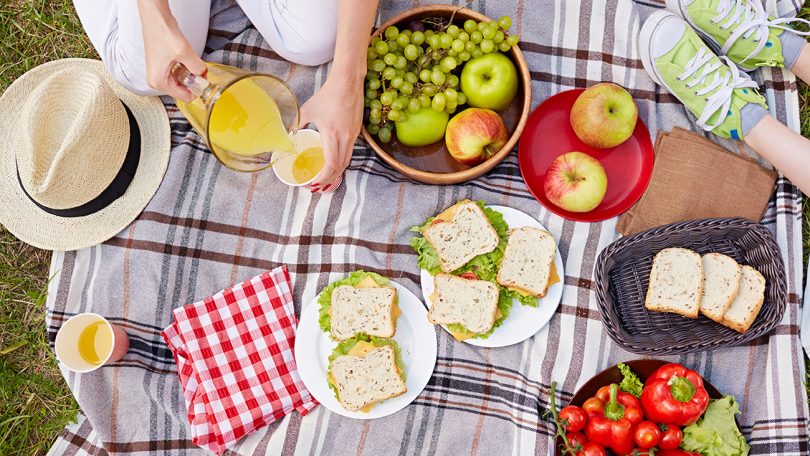In Canada, we’re not ones to take good weather for granted. According to Statistics Canada, seven out of 10 Canadians enjoy at least one outdoor activity in the summer. And for most of us, picnics are synonymous with summer. What better way to take advantage of the fine weather than to enjoy some delicious fresh food in the great outdoors?
In celebration of July’s National Picnic Month, here are some food tips and tricks to make the most of your summer picnics!
Start With a Plan
Remember that the first thing to consider for a picnic is keeping food at a safe temperature. Most of our foodborne illnesses stem from inadequate cooling and refrigeration of foods, so planning ahead really helps. Specifically, set up a potluck list with friends or family so you are bringing just enough amounts of food in order for it to be consumed, rather than making too much and having leftovers that may not be refrigerated in a timely manner.
Menu Planning Tips
Foods that are lower in moisture fare better in terms of spoilage, so avoid creamy dressings, seafood -, and egg-based dishes.
Instead, plan on bringing items such as:
- Cabbage salad.
- Roasted vegetables marinated in oil-and-vinegar dressings.
- Pre-made and individually-wrapped sandwiches or wraps with toasted whole grain bread, shredded veggies and chickpea tuna salad (using chickpeas instead of tuna).
- Homemade granola bars or dried fruits and nuts.
- Fresh fruits and vegetables are easy to bring to a picnic; however, ensure they are washed and packaged in clean containers in advance.
If you are planning on a roving picnic, consider packing finger foods or snacks in higher quantities, as multiple snacks can make a great source of sustenance while you are out and about. Sometimes, you may not have a spot where you can sit down so you are eating on the go. In this case, homemade muffins, trail mix, whole fruit like apples, cut up veggies like carrots, cucumbers, and bell peppers, and hard cheeses with whole grain crackers make great options.
Keep Things Cool
To provide a cooler environment for your foods, freeze reusable water bottles in advance to place in the cooler with your foods and additional ice packs – as the ice melts, you can use it for drinking, thereby ensuring your foods stay cold, and you have enough fluids for hydration.
Be Mindful of Your Meats
Remember that foodborne illnesses can spike during the summer season, with most of them related to animal-based protein consumption (undercooked or inadequately refrigerated meat products).
If you do plan to barbecue:
- Ensure that the raw meat is wrapped tightly and separate from other foods so that there is no spillage of raw meat juices, which can cause cross contamination.
- Bring a meat thermometer to ensure meat products are fully cooked before consuming them.
Or try using this opportunity to bring a vegetarian dish instead, as vegetarian proteins tend to pose a lower risk for food borne illness.
Keep Hygiene Top of Mind
Bringing wipes, hand sanitizer and clean cutlery, dishes, and supplies will help you to minimize the spread of infection while enjoying your time outdoors.
Pro Tip: Most picnic and outdoor sites do not have sufficient waste disposal options, so bring a garbage bag so that you can pack out and pack in your items to recycle later at home, or dispose in the proper waste containers. By being responsible for your own garbage, you are helping not only the cleanliness of the physical environment but considering wildlife safety as well.
However you decide to enjoy the great outdoors this summer, value the moment you are spending in nature and nourish yourself by packing a meal, enjoying it with others amongst the greenness of the trees. You will surely garner more benefits than you may have ever expected.
By Dani Renouf, RD, MSc, CDE, and Renal Resource Dietitian with Providence Health Care’s Clinical Nutrition Services.





